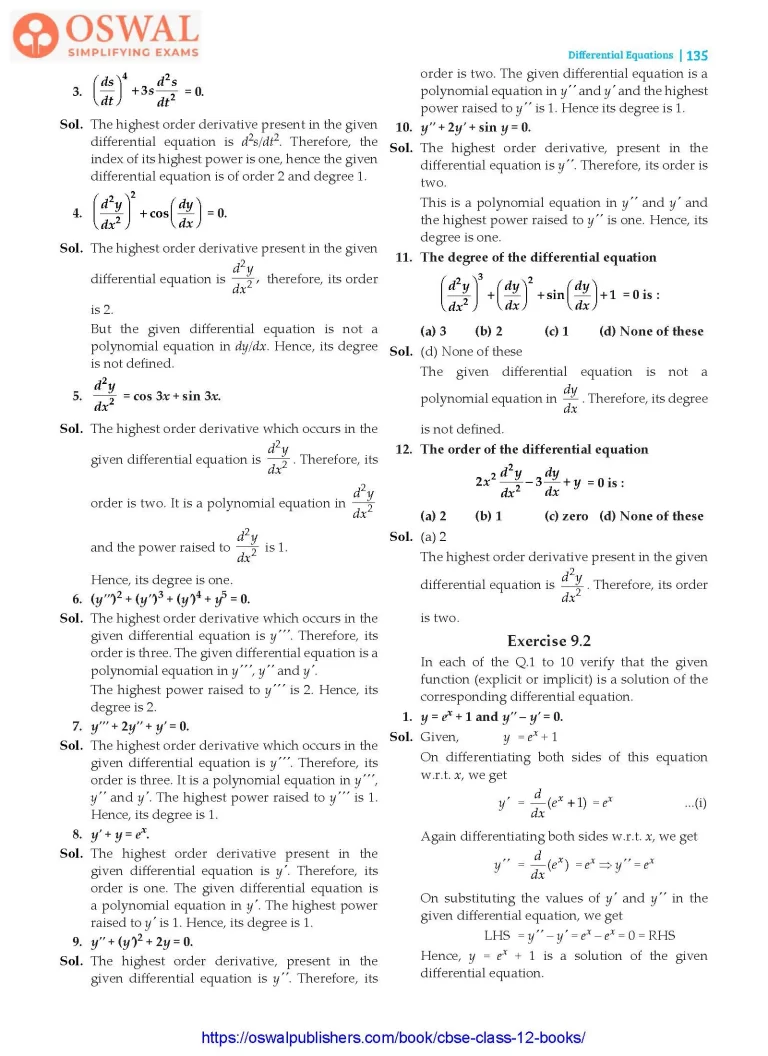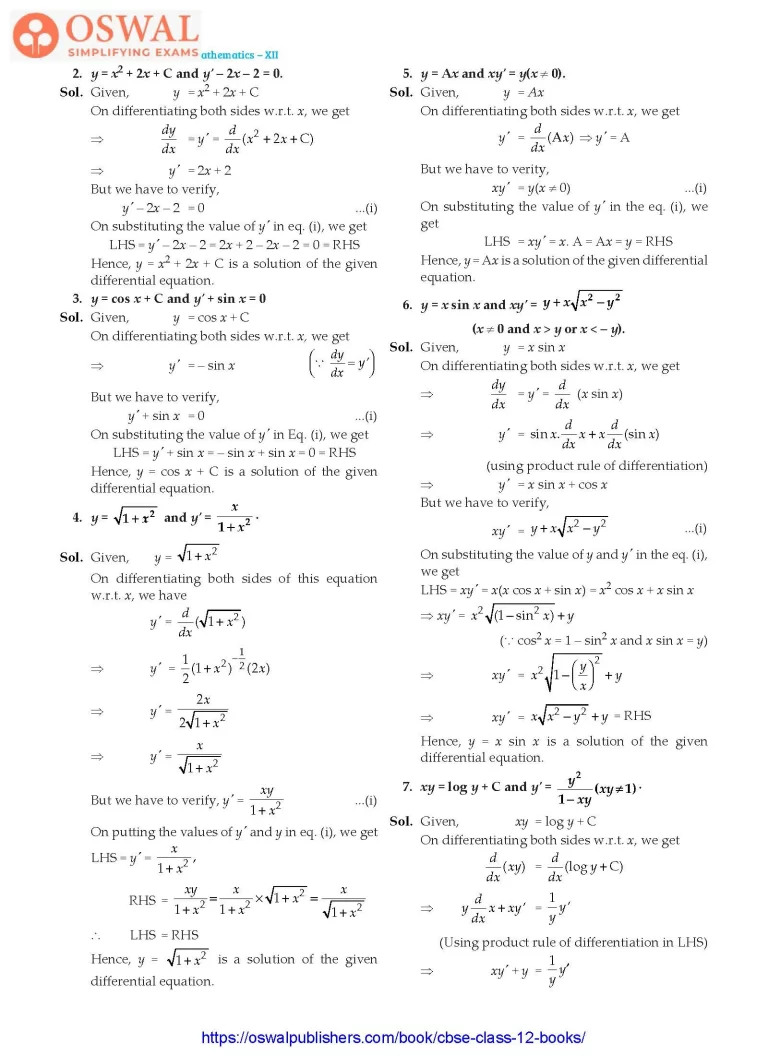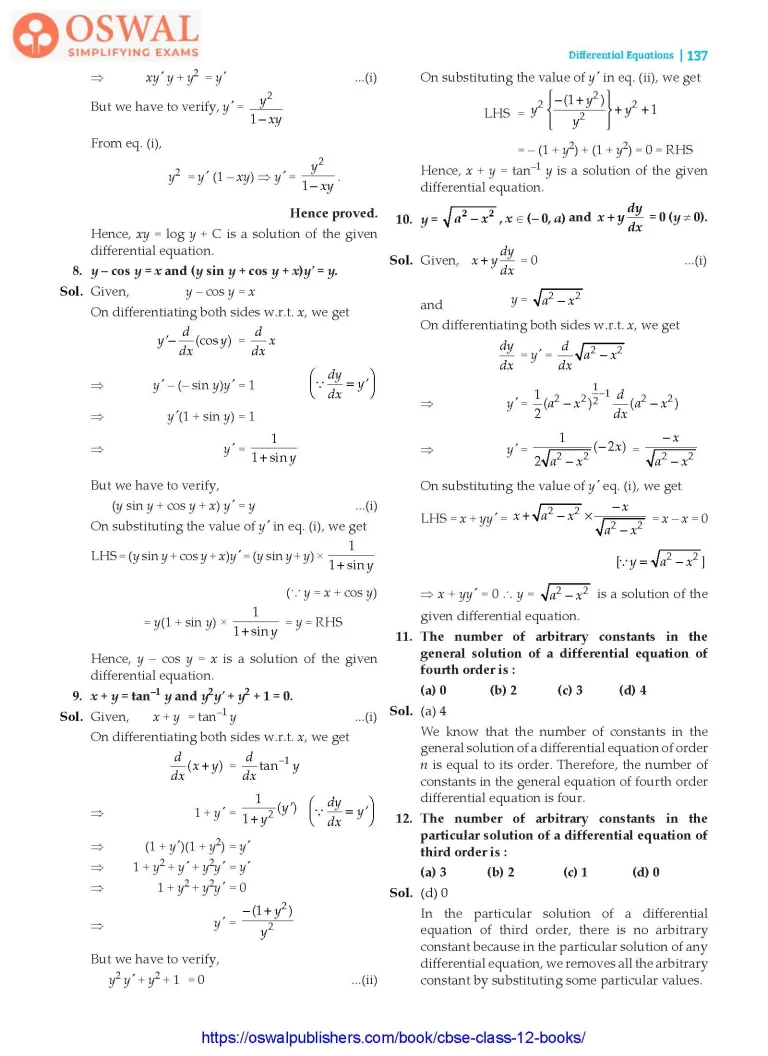NCERT Solutions for Class 12 Maths Chapter 9 - Differential Equations - Exercise 9.2



Access Exercises of Class 12 Maths Chapter 9 – Differential Equations
Exercise 9.1 Solutions 12 Questions
Exercise 9.2 Solutions 12 Questions
Exercise 9.3 Solutions 12 Questions
Exercise 9.4 Solutions 23 Questions
Exercise 9.5 Solutions 17 Questions
Exercise 9.6 Solutions 19 Questions
Miscellaneous Exercise on Chapter 9 Solutions 18 Questions
Exercise 9.2
In each of the Q.1 to 10 verify that the given function (explicit or implicit) is a solution of the corresponding differential equation.
1. y = ex + 1 and y'' – y' = 0.
Sol. Given, y = ex + 1
On differentiating both sides of this equation w.r.t. x, we get
$$y'=\frac{d}{dx}(e^{x}+1)=e^{x}\space\text{...(i)}$$
Again differentiating both sides w.r.t. x, we get
$$y'' =\frac{d}{dx}(e^{x})=e^{x}\\\Rarr\space y''= e^{x} $$
On substituting the values of y' and y'' in the given differential equation, we get
LHS = y'' – y' = ex – ex = 0 = RHS
Hence, y = ex + 1 is a solution of the given differential equation.
2. y = x2 + 2x + C and y' – 2x – 2 = 0.
Sol. Given, y = x2 + 2x + C
On differentiating both sides w.r.t. x, we get
$$\Rarr\space\frac{dy}{dx}=y'=\frac{d}{dx}(x^{2} + 2x+ C)\\\Rarr\space y' = 2x+2$$
But we have to verify,
y' – 2x – 2 = 0 ...(i)
On substituting the value of y' in eq. (i), we get
LHS = y' – 2x – 2 = 2x + 2 – 2x – 2 = 0 = RHS
Hence, y = x2 + 2x + C is a solution of the given differential equation.
3. y = cos x + C and y' + sin x = 0
Sol. Given, y = cos x + C
On differentiating both sides w.r.t. x, we get
$$\Rarr\space y'= -\text{sin x}\\\bigg(\frac{dy}{dx}= y'\bigg)$$
But we have to verify,
y' + sin x = 0 ...(i)
On substituting the value of y' in Eq. (i), we get
LHS = y' + sin x = – sin x + sin x = 0 = RHS
Hence, y = cos x + C is a solution of the given differential equation.
$$\textbf{4. y = }\sqrt{\textbf{1 + x}^{\textbf{2}}}\textbf{and y' =}\frac{\textbf{x}}{\textbf{1+x}^{\textbf{2}}}.\\\textbf{Sol.\space}\text{y = }\sqrt{1 + x^{2}}$$
On differentiating both sides of this equation w.r.t. x, we have
$$y'=\frac{d}{dx}(\sqrt{1 + x^{2}})\\\Rarr\space y' = \frac{1}{2}(1+x^{2})^{-\frac{1}{2}}(2x)\\\Rarr\space y'=\frac{2x}{2\sqrt{1+x^{2}}}\\\Rarr\space y'=\frac{x}{\sqrt{1+x^{2}}}\\\text{But we have to verify, y' =}\frac{xy}{1+x^{2}}\space\text{...(i)}$$
On putting the values of y' and y in eq. (i), we get
$$\text{LHS = y' =}\frac{x}{1+x^{2}},\\\text{RHS = }\frac{xy}{1+x^{2}}\\=\frac{x}{1+x^{2}}×\sqrt{1+x^{2}}=\frac{x}{\sqrt{1+x^{2}}}$$
∴ LHS = RHS
$$\text{Hence.\space} y=\sqrt{1+x^{2}}\space\text{is a solution of the}\\\text{given differential equation.}$$
5. y = Ax and xy' = y(x ≠ 0).
Sol. Given, y = Ax
On differentiating both sides w.r.t. x, we get
$$y'=\frac{d}{dx}(Ax)\Rarr\space \text{y'= A}$$
But we have to verity,
xy' = y(x ≠ 0) ...(i)
On substituting the value of y' in the eq. (i), we get
LHS = xy' = x. A = Ax = y = RHS
Hence, y = Ax is a solution of the given differential equation.
$$\textbf{6.\space y = x sin x\space and xy'=y + x}\sqrt{\textbf{x}^{\textbf{2}}\textbf{-}\textbf{y}^{\textbf{2}}}$$
$$\textbf{(x}\neq \textbf{0 and x}\text{\textgreater}\textbf{y}\space \textbf{or}\space \textbf{x}\text{\textless} \textbf{-y).}$$
Sol. Given, y = x sin x
On differentiating both sides w.r.t. x, we get
$$\Rarr\space\frac{dy}{dx}= y'=\frac{d}{dx}\text{x sin x}\\\Rarr\space y' = \text{sin x}.\frac{d}{dx} x + x\frac{d}{dx}(\text{sin x})$$
(using product rule of differentiation)
$$\Rarr\space \text{y' = x sin x + cos x}$$
But we have to verify,
$$xy'= y+x\sqrt{x^{2}-y^{2}}\space\text{...(i)}$$
On substituting the value of y and y' in the eq. (i), we get
LHS = xy' = x(x cos x + sin x) = x2 cos x + x sin x
$$\Rarr\space xy' = x^{2}\sqrt{(1 - \text{sin}^{2}x)}+y$$
(∵ cos2 x = 1 – sin2 x and x sin x = y)
$$\Rarr\space xy' = x^{2}\sqrt{1 - \bigg(\frac{y}{x}\bigg)^{2}}+y\\\Rarr\space xy' = x\sqrt{x^{2}-y^{2}}+y \space \text{= RHS} $$
Hence, y = x sin x is a solution of the given differential equation.
$$\textbf{7. xy = log y + C and}\\\space\textbf{y' =}\frac{\textbf{y}^{\textbf{2}}}{\textbf{1-xy}}(\textbf{xy}\neq\textbf{1).}$$
Sol. Given, xy = log y + C
On differentiating both sides w.r.t. x, we get
$$\frac{d}{dx}(xy) = \frac{d}{dx}(log\space y + \text{C})\\\Rarr\space y\frac{d}{dx}x + xy' = \frac{1}{y}y'$$
(Using product rule of differentiation in LHS)
$$\Rarr\space xy'+ y=\frac{1}{y}y'\\\Rarr\space xy' + y + y^{2} = y'\space\text{...(i)}\\\text{But we have to verify, y' =}\frac{y^{2}}{1-xy}\\\text{From eq. (i),}\\\text{y}^2\text{ = y' (1 – xy)}\\\Rarr\space y'=\frac{y^{2}}{1-xy}.$$
Hence proved.
Hence, xy = log y + C is a solution of the given differential equation.
8. y – cos y = x and (y sin y + cos y + x)y' = y.
Sol. Given, y – cos y = x
On differentiating both sides w.r.t. x, we get
$$y'-\frac{d}{dx}(cos \space y) = \frac{d}{dx}x\\\Rarr\space y'-(- sin \space y)y'=1\\\bigg(\because\space \frac{dy}{dx} = y'\bigg)\\\Rarr\space y'(1 + sin \space y)=1\\\Rarr\space y' = \frac{1}{1 + sin\space y}$$
But we have to verify,
(y sin y + cos y + x) y' = y ...(i)
On substituting the value of y' in eq. (i), we get
LHS = (y sin y + cos y + x)y'=
$$(y \space sin\space y + y)×\frac{1}{\text{1 + sin y}}$$
(∵ y = x + cos y)
$$ = y(1 + sin y)×\frac{1}{\text{1 + sin y}}\\\text{= y = RHS}$$
Hence, y – cos y = x is a solution of the given differential equation.
$$\textbf{9.\space x + y = tan}^{\normalsize-1}\textbf{y}\space \textbf{and}\space \textbf{y}^{\textbf{2}}\textbf{y' + y}^{\textbf{2}} \textbf{+ 1 = 0.}$$
Sol. Given, x + y = tan–1 y ...(i)
On differentiating both sides w.r.t. x, we get
$$\frac{d}{dx}(x+y) = \frac{d}{dx}\text{tan}^{\normalsize-1}y\\\Rarr\space 1+y' = \frac{1}{1+y^{2}}(y')\\\bigg(\because\space \frac{dy}{dx} = y'\bigg)$$
$$\Rarr (1 + y')(1 + y^2) = y' \\\Rarr 1 + y^2 + y' + y^2y' = y'\\\Rarr 1 + y^2 + y^2y' = 0\\\Rarr\space y' = \frac{-(1 + y^{2})}{y^{2}}$$
But we have to verify,
y2 y' + y2 + 1 = 0 ...(ii)
On substituting the value of y' in eq. (ii), we get
$$\text{LHS = y}^{2}\begin{Bmatrix}\frac{-(1+y^{2})}{y^{2}}\end{Bmatrix}+y^{2}+1$$
= – (1 + y2) + (1 + y2) = 0 = RHS
Hence, x + y = tan–1 y is a solution of the given differential equation.
$$\textbf{10.\space y = }\sqrt{\textbf{a}^{\textbf{2}}\textbf{- x}^{\textbf{2}}}\space\textbf{,\space x}\epsilon \textbf{(-0,a)}\space\\\textbf{x + y}\frac{\textbf{dy}}{\textbf{dx}}\textbf{= 0}\space\textbf{(y}\neq\textbf{ 0).}\\\textbf{Sol.\space}\text{Given}\space x + y\frac{dy}{dx}=0\qquad\text{...(i)}\\\text{and}\space y=\sqrt{a^{2}-x^{2}}$$
On differentiating both sides w.r.t. x, we get
$$\text{LHS = x + yy' = x + }\sqrt{a^{2}-x^{2}}×\frac{-x}{\sqrt{a^{2}-x^{2}}}$$
= x – x = 0
$$\lbrack\because\space y = \sqrt{a^{2}-x^{2}}\rbrack\\\Rarr\space x + yy' = 0\space\therefore\space y = \sqrt{a^{2}-x^{2}}$$
is a solution of the given differential equation.
11. The number of arbitrary constants in the general solution of a differential equation of fourth order is :
(a) 0
(b) 2
(c) 3
(d) 4
Sol. (a) 4
We know that the number of constants in the general solution of a differential equation of order n is equal to its order. Therefore, the number of constants in the general equation of fourth order differential equation is four.
12. The number of arbitrary constants in the particular solution of a differential equation of third order is :
(a) 3
(b) 2
(c) 1
(d) 0
Sol. (d) 0
In the particular solution of a differential equation of third order, there is no arbitrary constant because in the particular solution of any differential equation, we removes all the arbitrary constant by substituting some particular values.
